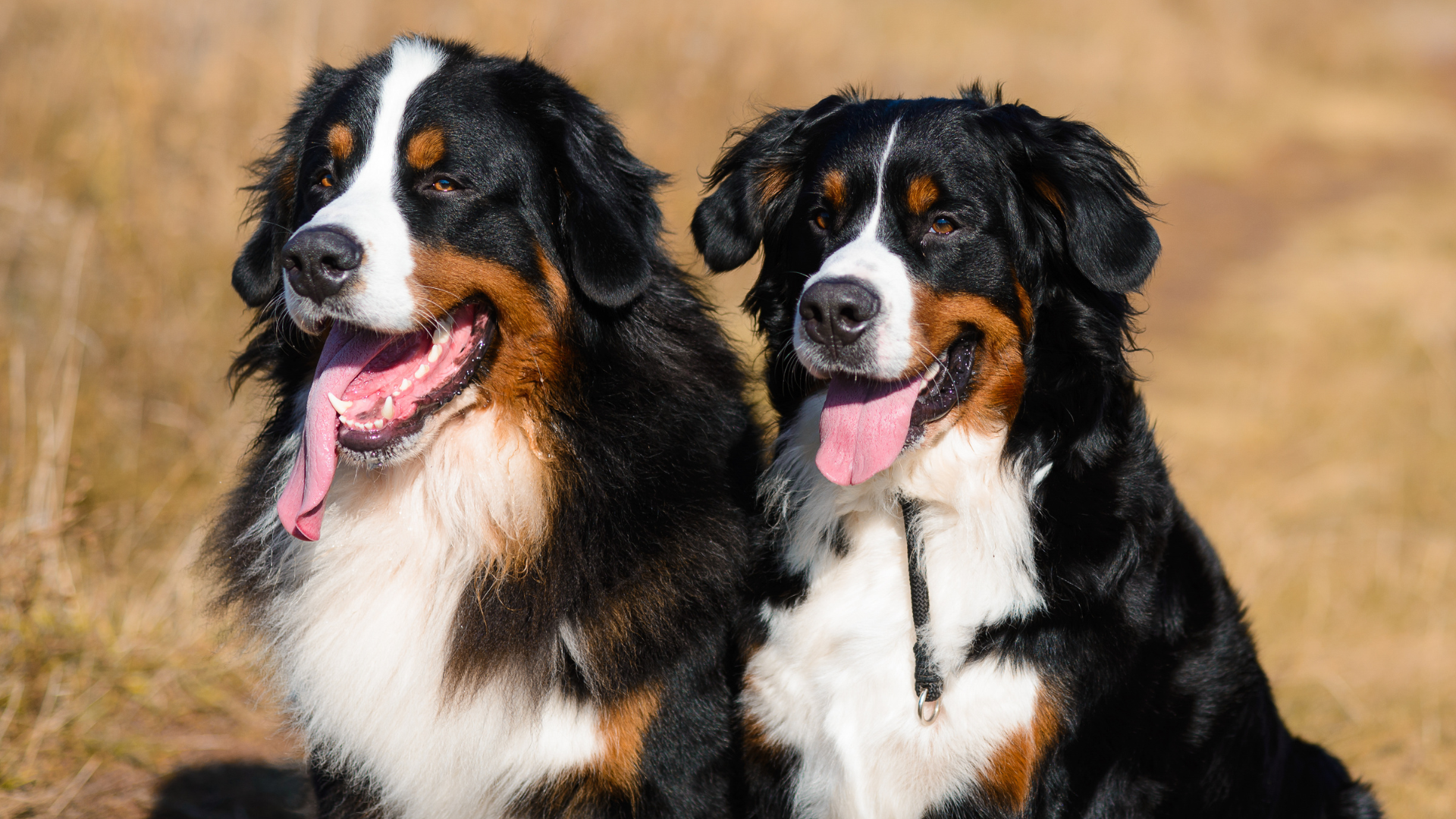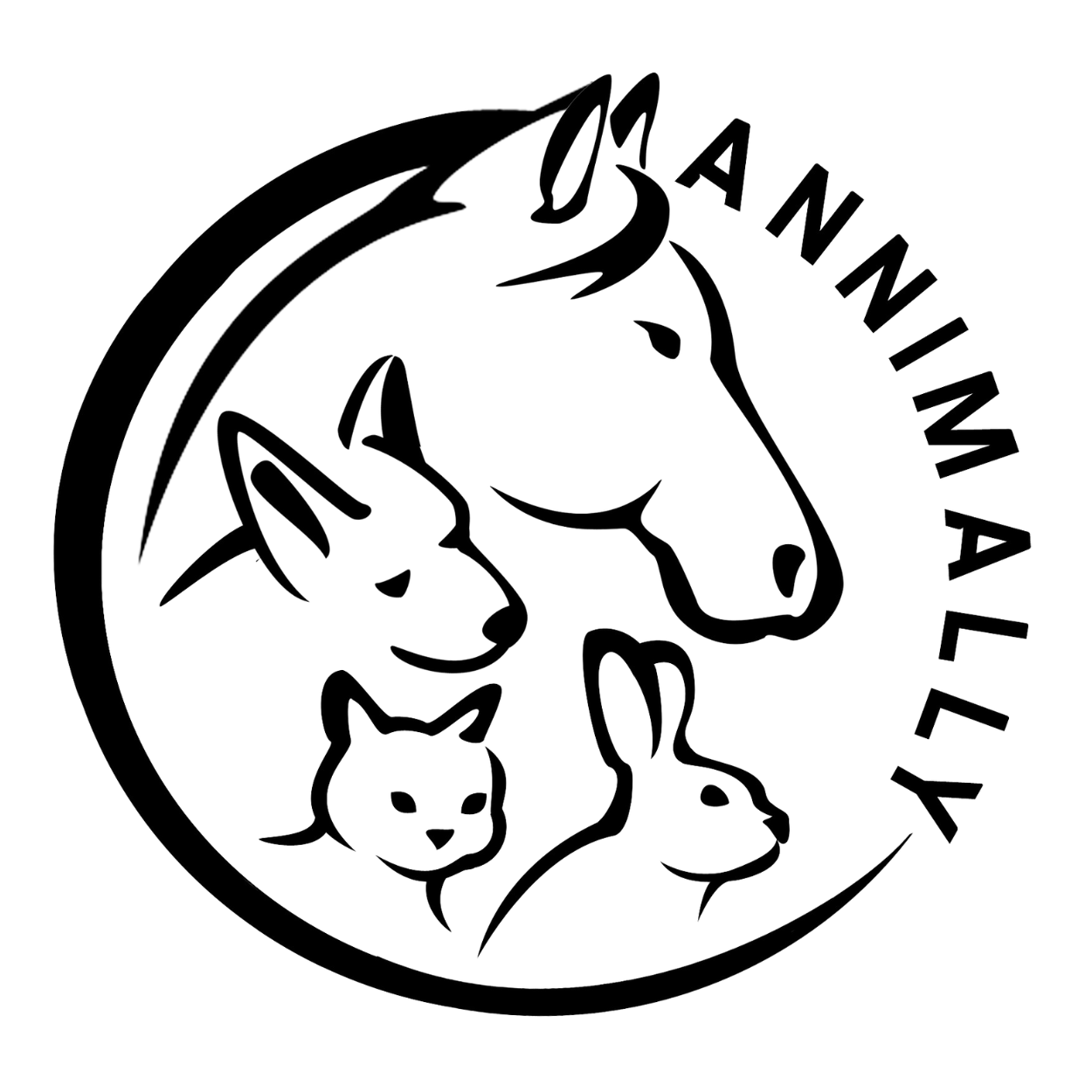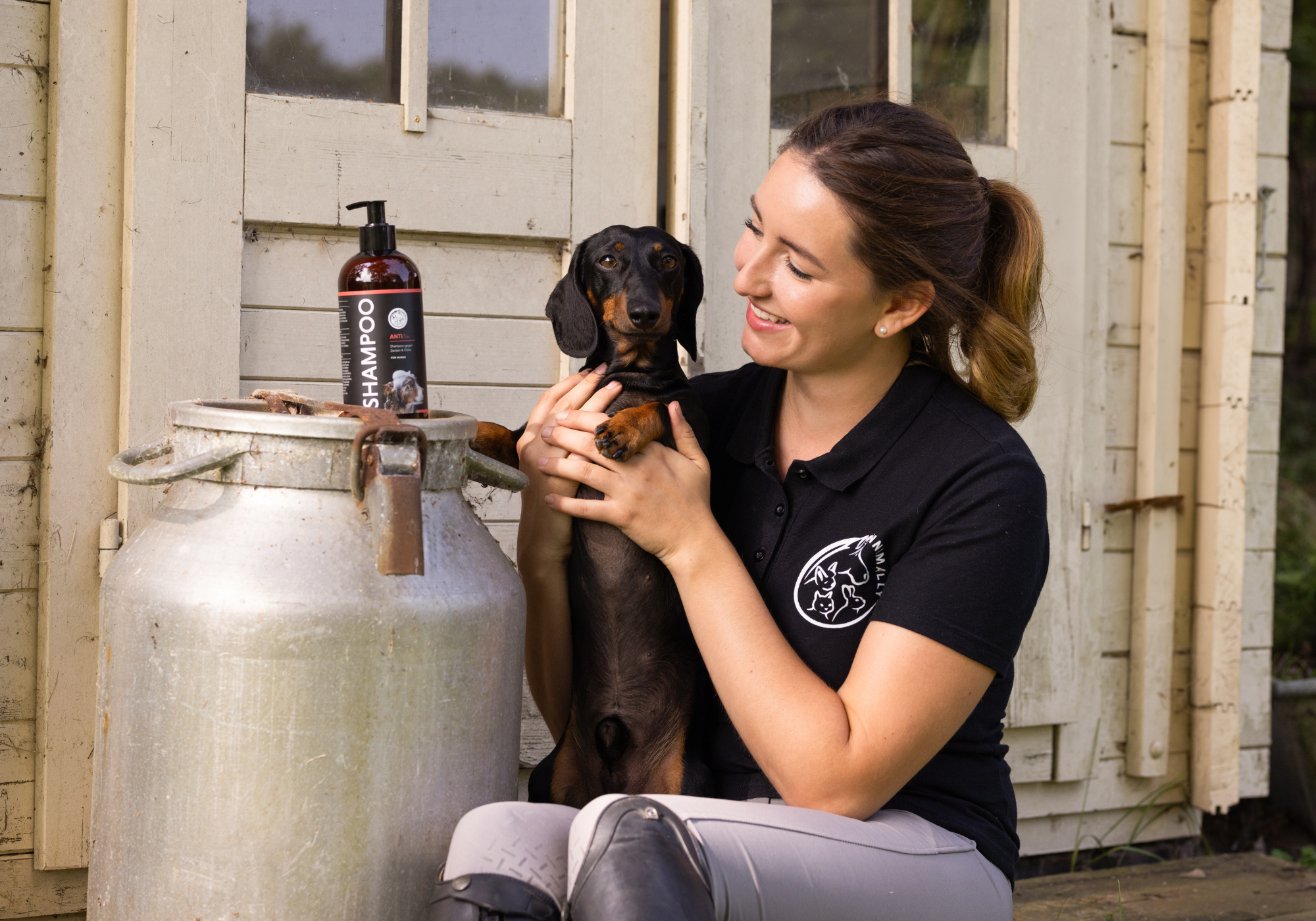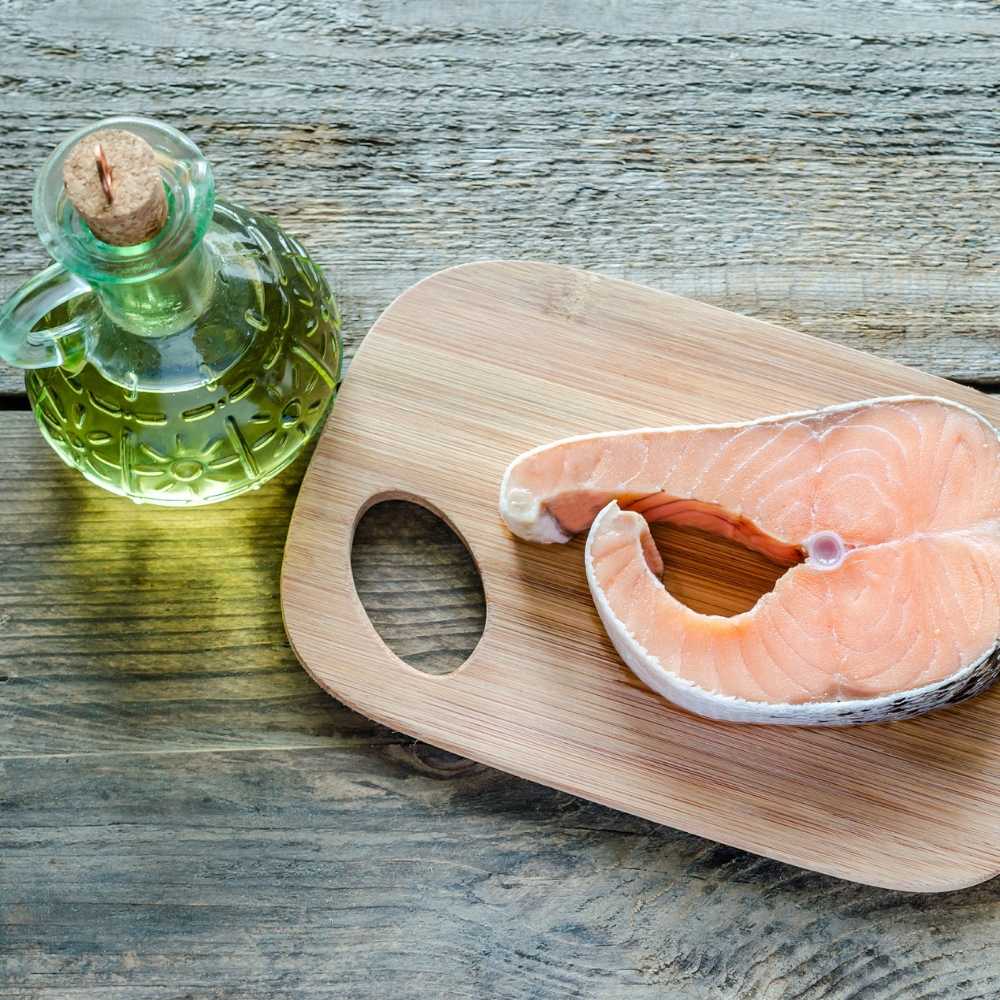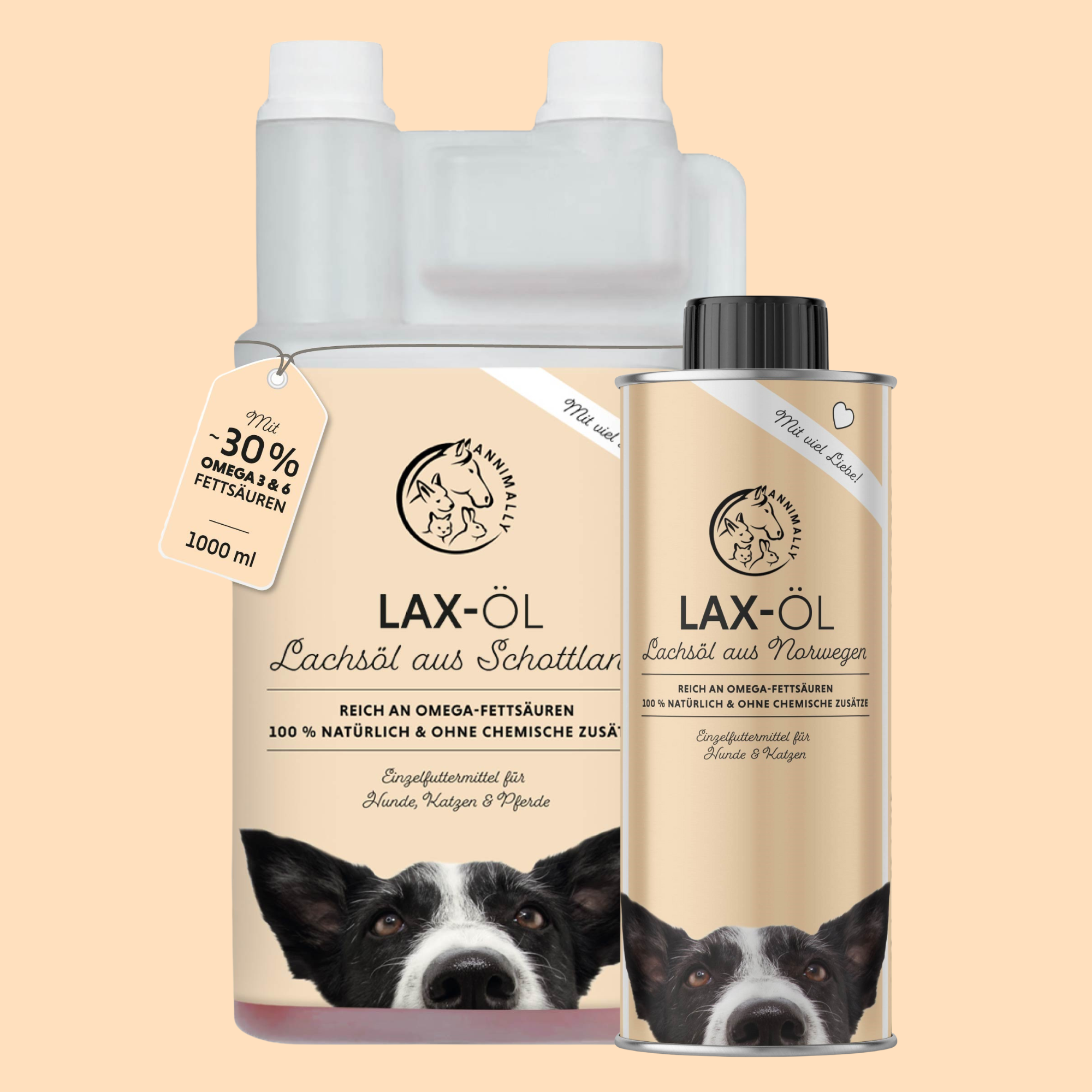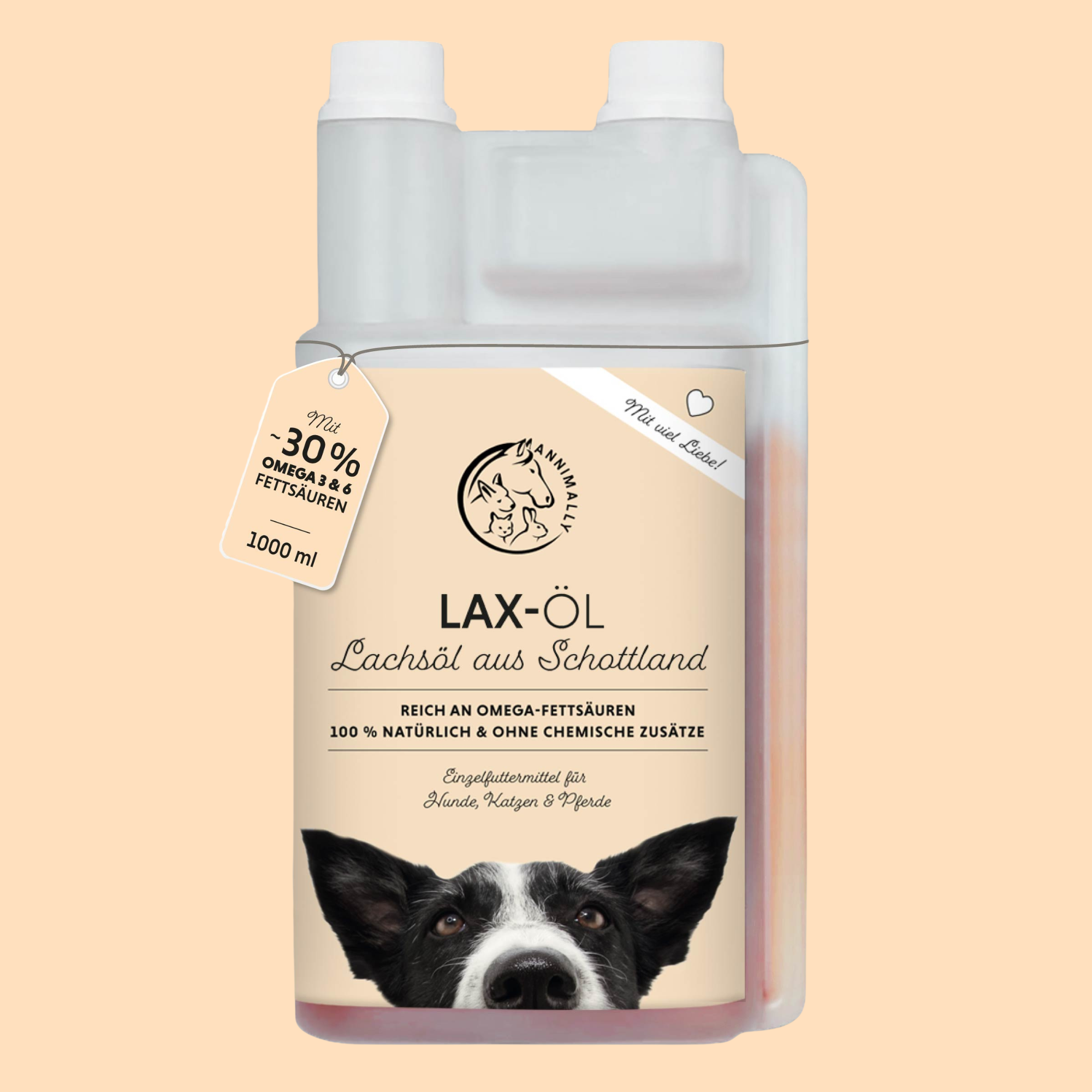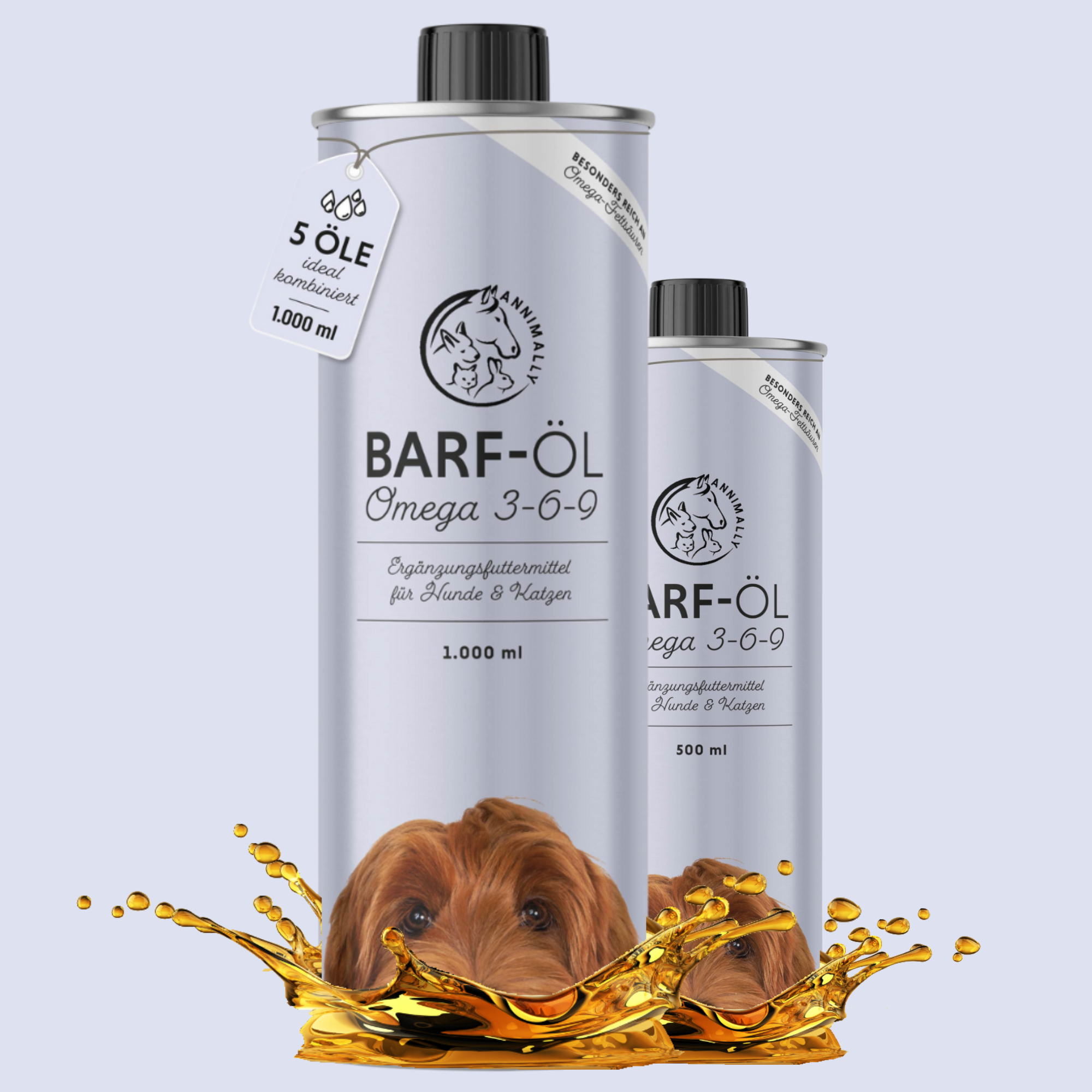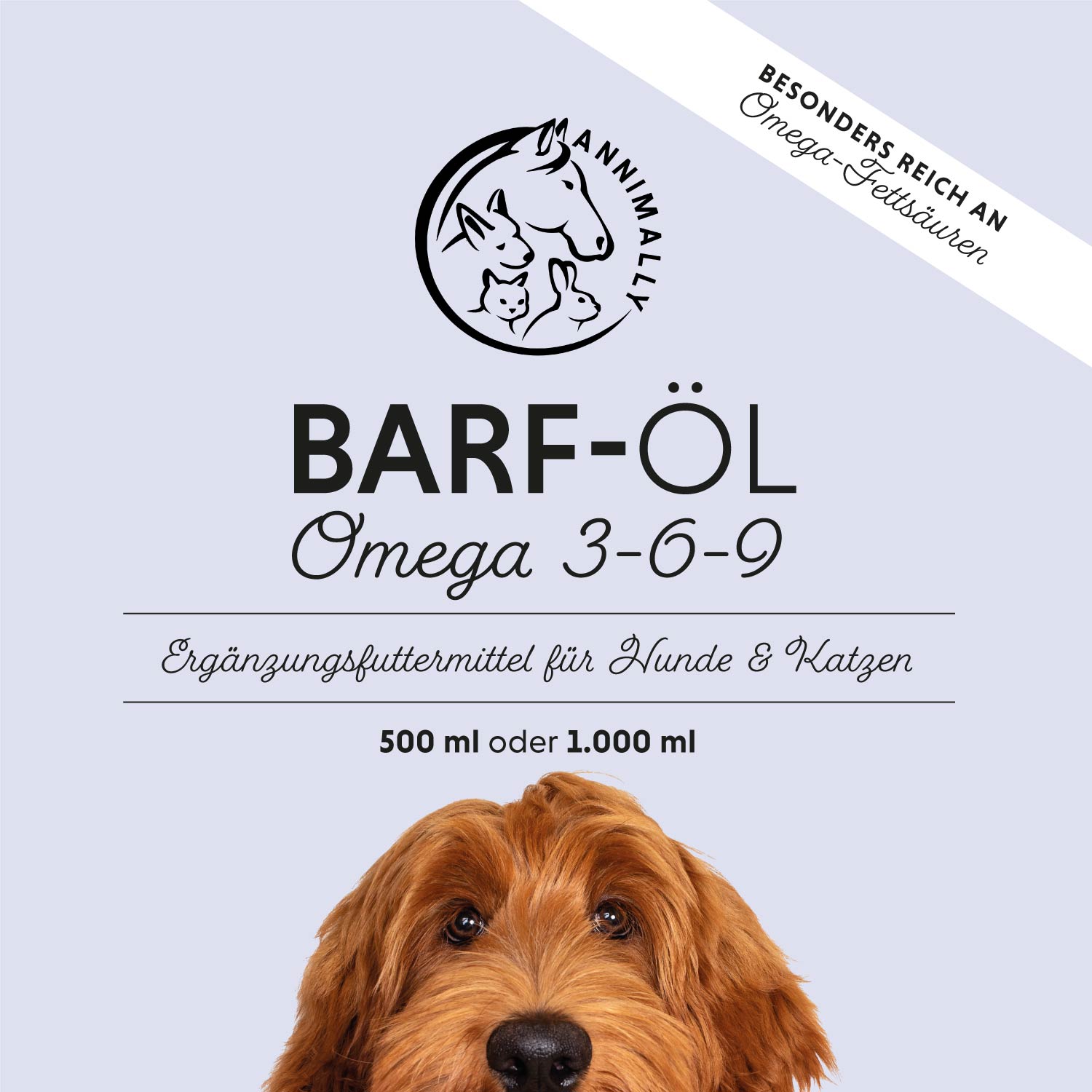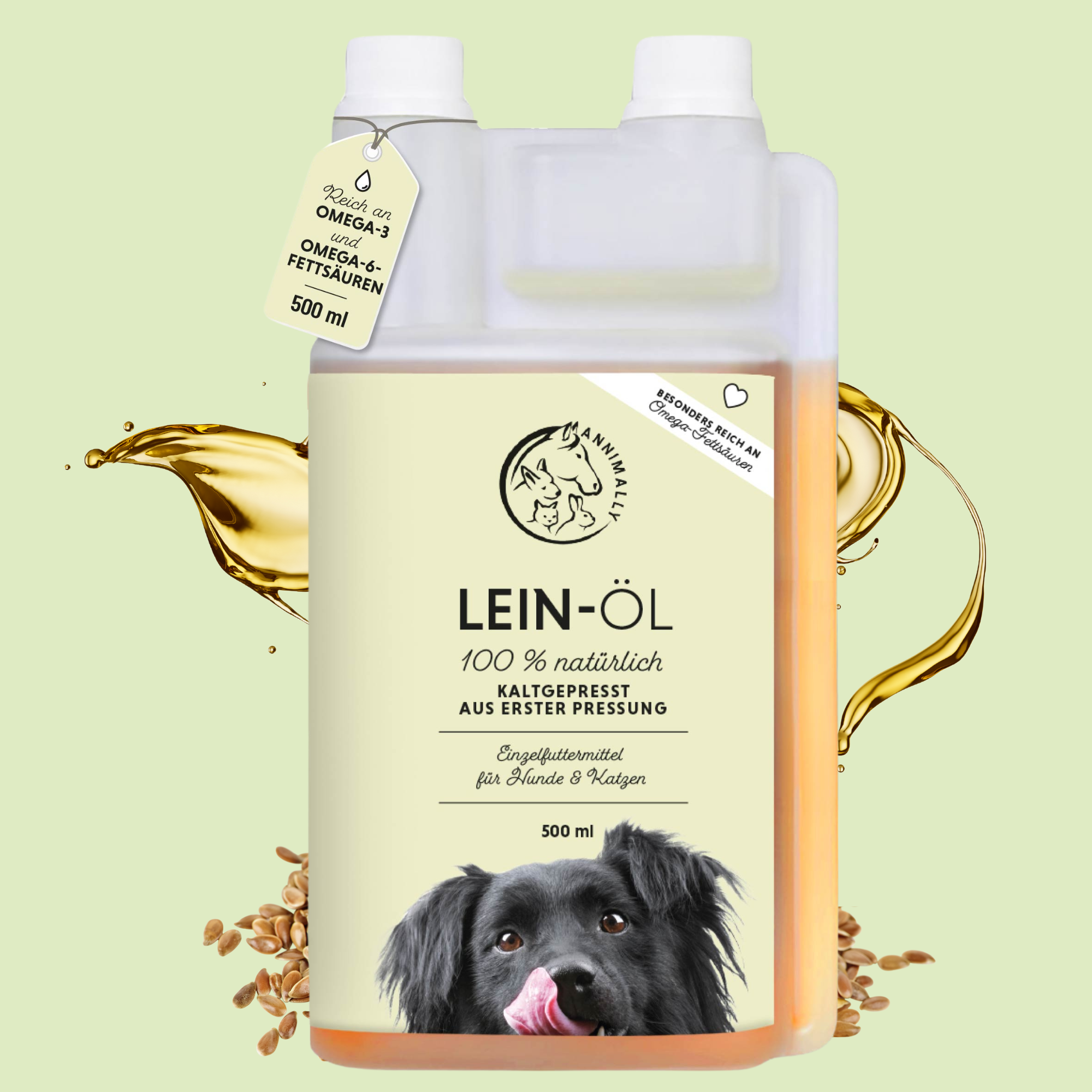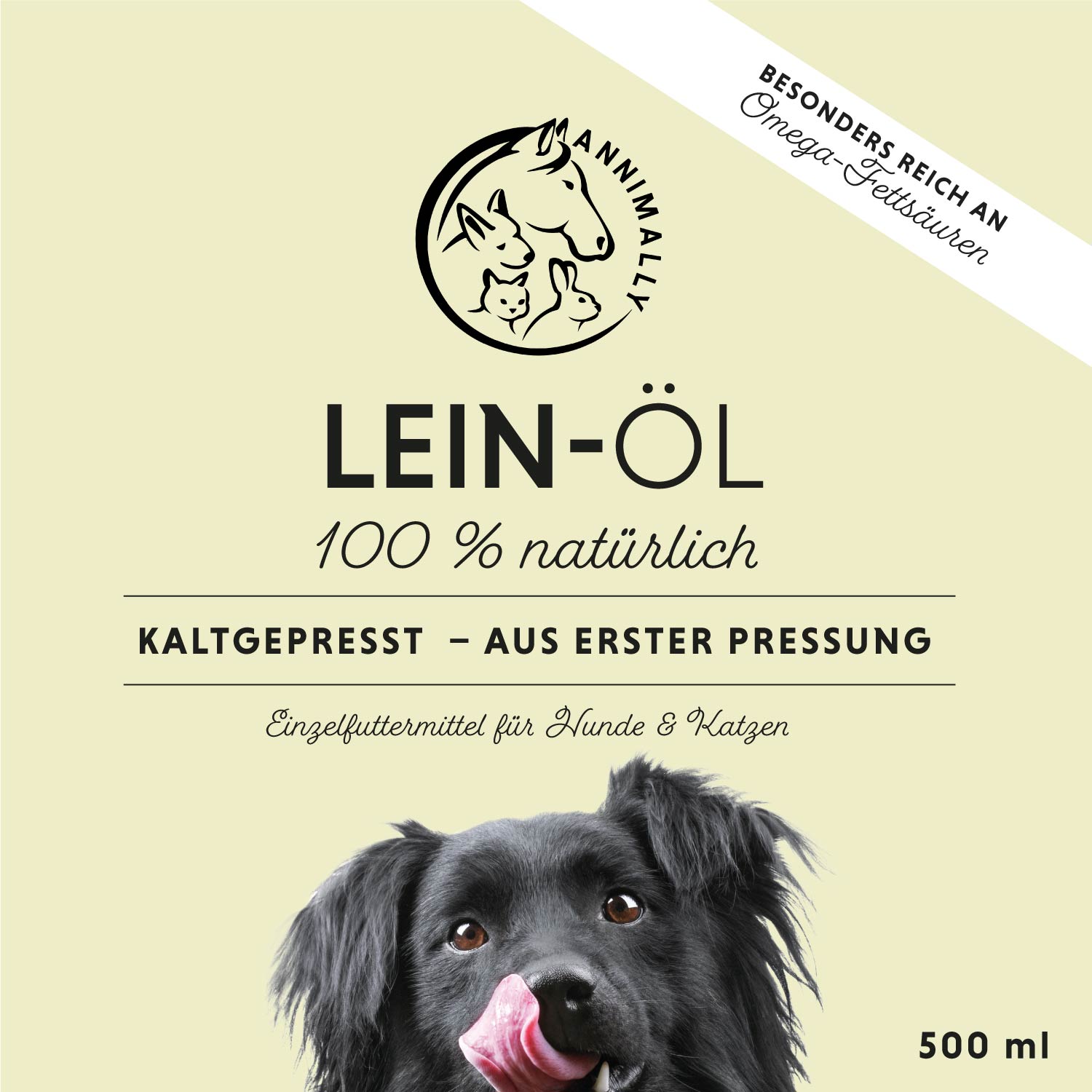Salmon Oil for Dogs: A Comprehensive Guide to Your Four-legged Friend's Health
Proper nutrition is a crucial factor for your dog's health and well-being. In addition to a balanced diet, certain supplements can help improve your dog's vitality and quality of life. One of these natural supplements is salmon oil. It contains valuable omega-3 fatty acids, which can have numerous positive effects on your dog's skin, coat, joints, immune system, and even cognitive health.
But why is salmon oil so valuable for dogs? What health benefits does it offer? What is the optimal dosage, and what should you look for when buying it? In this detailed blog post, you'll learn everything about salmon oil for dogs—and how you can use it to benefit your four-legged friend.

What is salmon oil actually?
Salmon oil is a high-quality natural product derived from salmon. It belongs to the fish oil group and is particularly known for its high content of essential fatty acids. The oil is extracted from either the meat, skin, or entrails of the salmon and then purified to make it usable as a dietary supplement for dogs, cats, horses, and even humans.
How is salmon oil made?
Salmon oil can be produced in different ways, with the quality of the final product depending heavily on the extraction method.
-
cold pressing – This gentle method mechanically presses salmon oil from the fish tissue without using high temperatures. This ensures the best possible preservation of the valuable omega-3 fatty acids, vitamins, and antioxidants.
-
Extraction by heating – This method extracts salmon oil by heating the fish tissue. While efficient, it can destroy some sensitive nutrients.
-
Industrial refining – In this method, the salmon oil is further processed and purified to remove contaminants such as heavy metals or environmental toxins. Some manufacturers also add antioxidants to improve shelf life.
The best choice for your dog is cold-pressed or gently extracted salmon oil from sustainable fish farming or wild-caught, as it offers the highest nutrient density.
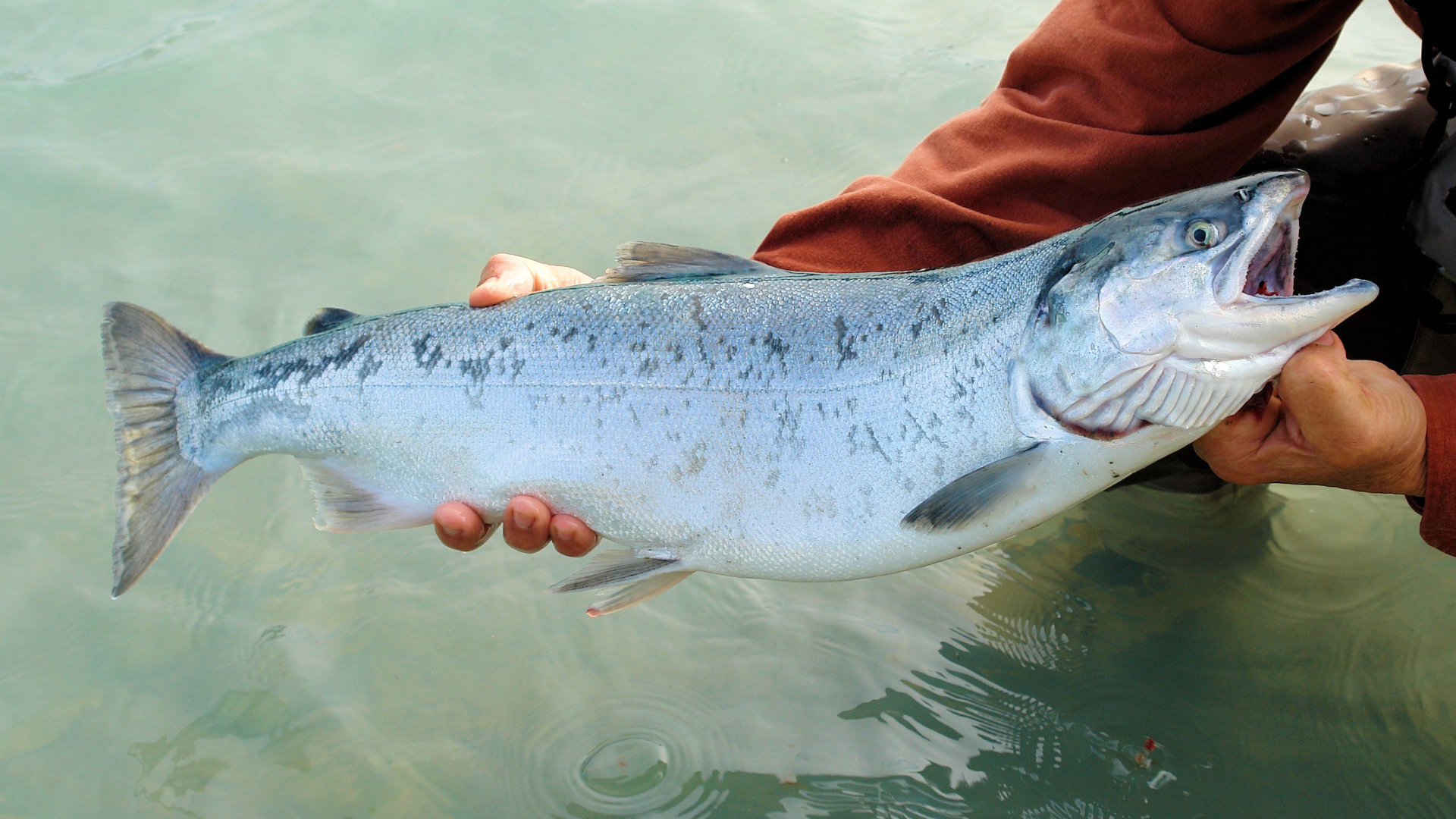
What important ingredients does salmon oil contain?
Salmon oil is not just a simple source of fat, but contains a variety of valuable nutrients that can have a positive effect on your dog's health:
✅ Omega-3 fatty acids (EPA & DHA) : Omega-3 fatty acids are unsaturated fatty acids that your dog cannot produce itself and therefore must obtain through its diet. Salmon oil contains two particularly valuable forms:
-
EPA (eicosapentaenoic acid) – This fatty acid is known for its anti-inflammatory properties and plays a major role in joint health. It can help relieve arthritis symptoms and improve mobility.
-
DHA (docosahexaenoic acid) – This fatty acid is especially important for the brain and neural pathways. It contributes to the mental development of puppies and can help support cognitive function in older dogs.
✅ Omega-6 fatty acids : Omega-6 is also one of the essential fatty acids that play a crucial role in cell growth, skin health, and the immune system. They are found in many foods, especially meat and vegetable oils such as sunflower or soybean oil. However, an excess of omega-6 can be problematic because they can promote inflammation. The correct ratio of omega-6 to omega-3 (ideally 5:1 to 10:1) is therefore crucial for your dog's vitality. Salmon oil helps improve this balance and reduce potential inflammation in the body.
✅ Vitamin A: Vitamin A is a fat-soluble vitamin that performs a variety of functions in your dog’s body:
-
eyesight – Supports eye health and especially helps with adjusting vision in the dark.
-
Skin & Fur – Promotes skin cell regeneration and can help improve dry or flaky skin.
-
immune system – Strengthens the body’s defenses by supporting the production of immune cells.
A vitamin A deficiency can lead to dry skin, a weak immune system, and vision problems. Salmon oil contains a natural form of this important vitamin.
✅ Vitamin D: Vitamin D is important for regulating calcium and phosphorus levels in the body. It ensures that your dog's bones and teeth remain strong.
-
Bone health – Supports bone growth and stability, especially important for puppies and older dogs.
-
Muscle function – Promotes muscle strength and can counteract muscle cramps or weakness.
-
immune system – Contributes to strengthening the immune system.
Since dogs can only synthesize vitamin D to a limited extent through their skin, additional intake through food is often useful.
✅ Vitamin E: Vitamin E is one of the most important antioxidants in your dog's body. It helps prevent cell damage caused by free radicals and thus has an anti-aging effect.
✔ Protects cell membranes and can reduce the risk of age-related diseases.
✔ Supports the immune system and improves the body's defenses against diseases.
✔ Promotes skin and coat health and can help reduce dry skin.
A deficiency in vitamin E can lead to muscle weakness, immune system problems and skin irritations.
✅ Astaxanthin: Astaxanthin is a natural pigment (carotenoid) that gives salmon its reddish color. It is one of the most powerful antioxidants found in nature and can effectively reduce cell damage and inflammation.
✔ Cell protection & regeneration – Protects your dog’s cells from oxidative stress and promotes regeneration after exertion.
✔ Joint health – Can have an anti-inflammatory effect and thus help support the joints.
✔ Promotes skin health and can help relieve itching and redness.
✔ Strengthens the immune system by fighting free radicals.
Astaxanthin is therefore a valuable addition to salmon oil, helping your dog feel vital and energetic.
Why does your dog need omega-3 fatty acids?
Omega-3 fatty acids are essential fatty acids that dogs cannot produce themselves. They must therefore be obtained through food. Regular dog food often contains too many omega-6 fatty acids, which are found in meat and grains. An imbalance between omega-6 and omega-3 fatty acids can lead to inflammation, skin problems, and other health issues.
By adding salmon oil, you can correct this imbalance and provide your dog with many health benefits.

The 7 most important benefits of salmon oil for dogs
-
Salmon oil for healthy skin and shiny coat: A healthy dog often demonstrates this with a soft, shiny coat. Salmon oil improves coat texture, reduces dandruff, and can relieve itching or skin inflammation. It's a particularly valuable supplement for dogs with allergies or dry skin.
-
Support of joints and mobility: Older dogs, or those with arthritis or joint problems, especially benefit from the anti-inflammatory effects of omega-3 fatty acids. Salmon oil can help maintain joint mobility and relieve pain.
-
Strengthening the immune system: A strong immune system is crucial for your dog's health. The antioxidants in salmon oil can help fight inflammation and support the body's defenses.
-
Promoting heart health: Salmon oil helps regulate cholesterol levels, improve circulation, and strengthen your dog's cardiovascular system. Older dogs especially benefit from these effects.
-
Supports brain function and cognitive abilities: Omega-3 fatty acids are important not only for the body but also for the brain. They promote cognitive function and can counteract age-related mental decline.
-
Digestive system support: Salmon oil for dogs can promote healthy digestion by supporting intestinal flora and helping to reduce inflammation in the digestive tract.
-
Improve wound healing and regeneration: Whether after surgery or for minor injuries, salmon oil can accelerate wound healing and help the body regenerate faster.
Difference between omega-3 and omega-6 fatty acids
Both fatty acids are essential for your dog's well-being. Omega-6 fatty acids are often found in commercially available dog food because they are found in vegetable oils and meat. The problem: Too high a concentration of omega-6 fatty acids can have a pro-inflammatory effect, while omega-3 has anti-inflammatory properties.
The ideal ratio of omega-6 to omega-3 is 5:1 to 10:1. However, many dog foods contain significantly more omega-6, which is why giving salmon oil as a supplement to dogs is a sensible option.
How do you dose salmon oil correctly for dogs?
The right amount of salmon oil depends on your dog's weight. Overdosing should be avoided, as it can lead to digestive problems or weight gain. A gradual introduction is recommended to ensure your dog tolerates the salmon oil well.
Here are the general dosage recommendations:
-
Small dogs (up to 10 kg): approx. 0.5 teaspoon (2–3 ml) per day
-
Medium-sized dogs (10–25 kg): approx. 1 teaspoon (5 ml) per day
-
Large dogs (over 25 kg): approx. 1.5 to 2 teaspoons (7–10 ml) per day
💡 Tip:
-
When feeding, start with a smaller amount and increase it slowly to test tolerance.
-
If your dog shows digestive problems (e.g., loose stools), reduce the dose slightly and increase it more slowly.
-
Pay attention to the total calorie intake – if your dog is prone to weight gain, adjust the daily amount of food accordingly.
With the right dosage, you can ensure that your dog gets the most out of salmon oil's health benefits without risking unwanted side effects.
Possible side effects of salmon oil for dogs
Although salmon oil offers many benefits, in some cases it can also have side effects:
✅ Digestive problems → Too much salmon oil can cause diarrhea or loose stools.
✅ Weight gain → Salmon oil is high in calories. If your dog is overweight, the total amount of food should be adjusted.
✅ Imbalance of fatty acids → An overdose can shift the ratio of omega-6 to omega-3 too much.
✅ Contamination → Cheap products may contain heavy metals or pollutants.
For this reason: Make sure you use high-quality, purified salmon oil!
What should you look for when buying salmon oil?
Not all salmon oil products are of the same quality. Keep the following in mind:
✅ Cold-pressed or gently extracted oil → Better nutrient retention.
✅ Free from additives → No preservatives or artificial flavors.
✅ High omega-3 content → A good proportion of EPA and DHA is crucial.
✅ Sustainable fish farming → Wild salmon or sustainable fishing should be preferred.
💡 Tip: Buy salmon oil in dark bottles or containers, as light and oxygen can affect the quality of the oil.
Conclusion: Is salmon oil good for your dog?
Definitely yes! Salmon oil is a high-quality supplement that can have a positive effect on your dog's skin, coat, joints, immune system, and overall vitality.
Whether it's a puppy, adult dog, or senior – with the right dosage and a high-quality, premium product, you can offer your four-legged friend real added health benefits.
